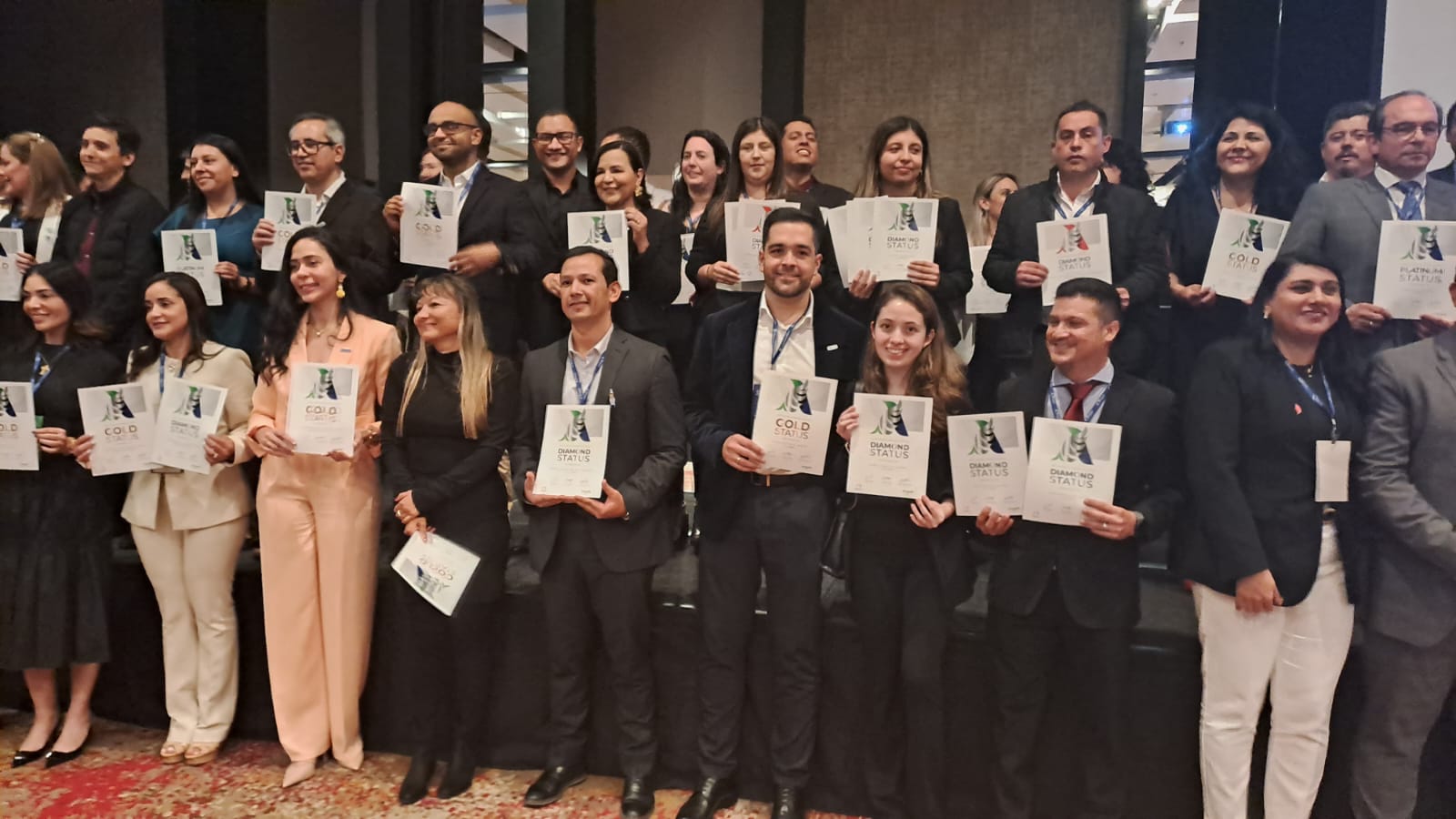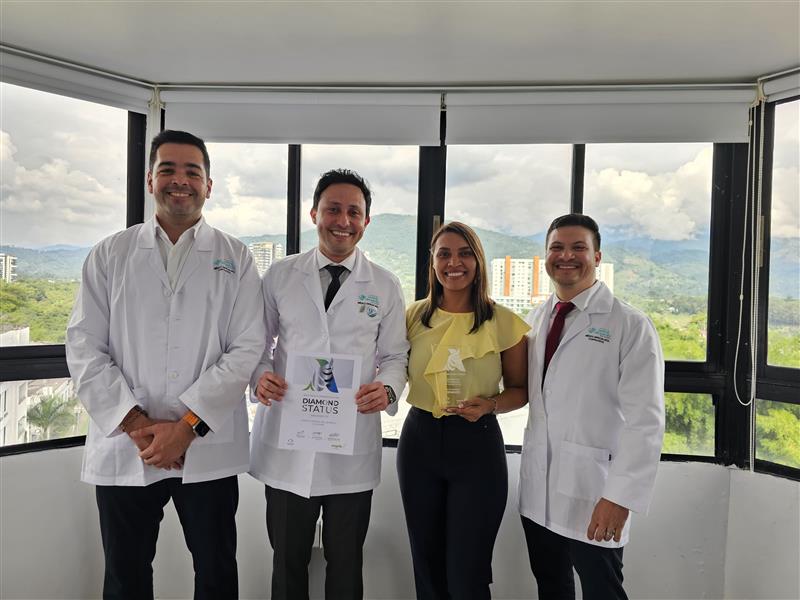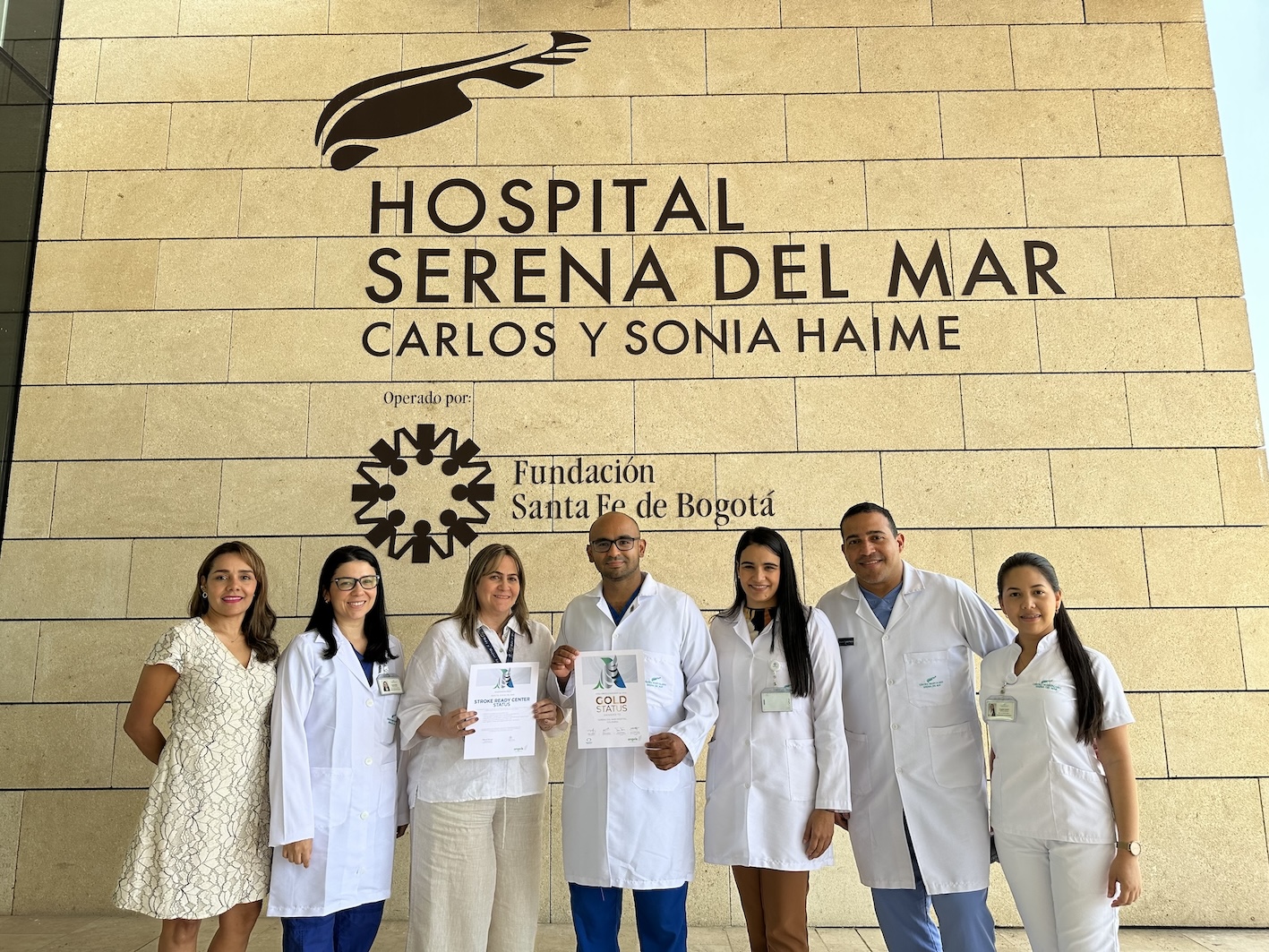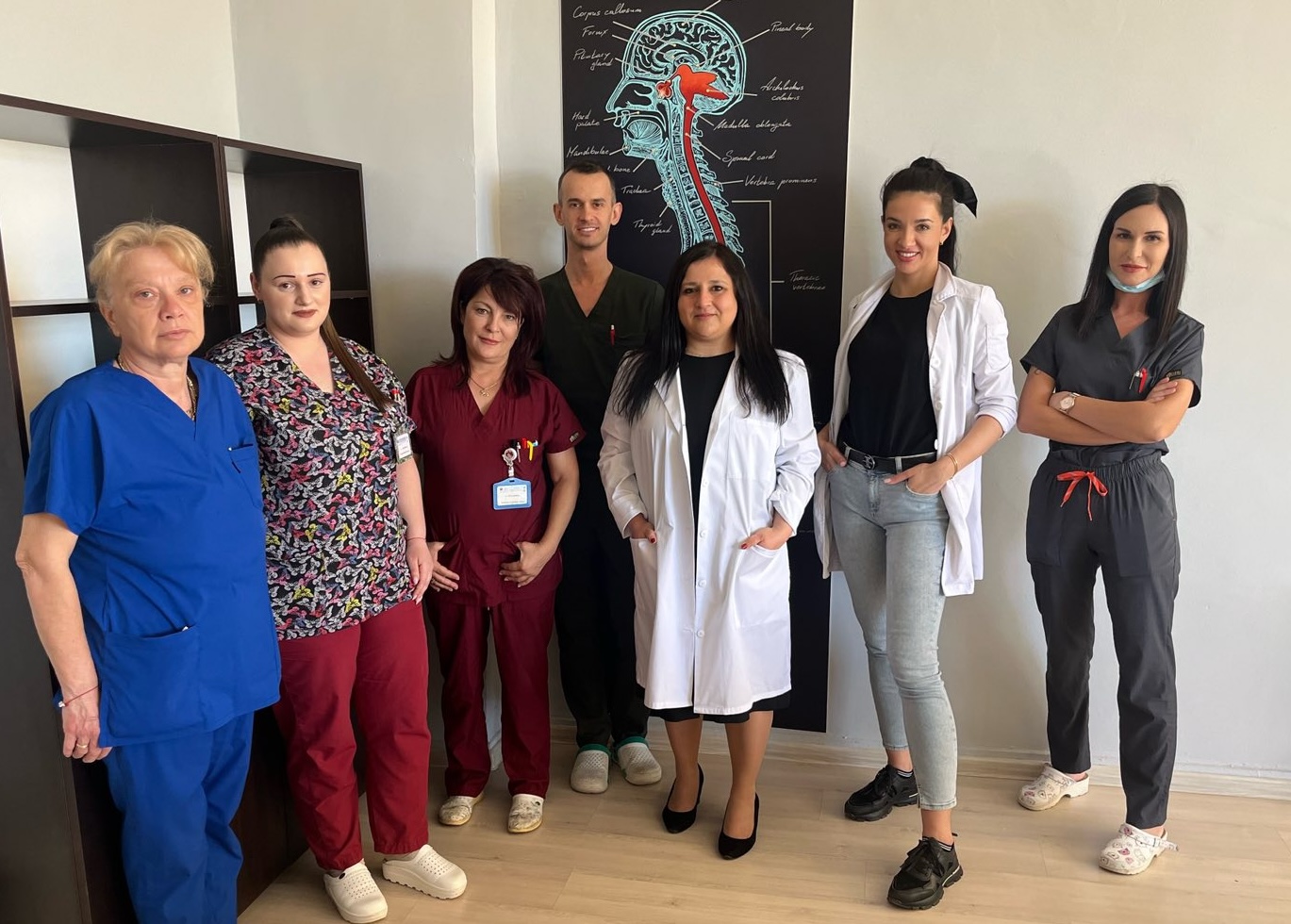
В Q3 2023 г., после лечения 67,7% инсультов в течение менее 60 минут и увеличения частоты реканализация до 26,8%, проф. UMHAT д-р Стоян Киркович, университетская больница, расположенная в Старе Загоре, получила первую награду Европейская организация по борьбе с инсультом (ESO) Золотая награда Angels. Здесь рассказывается история, что:
Д-р Теодора Манольова-Манчева, заведующая неврология отделением.
Д-р Христо Димитров, врач Центра неотложной медицинской помощи и несчастных случаев.
проф. Йовхо Йовчев, директор больницы.
Д-р Бозидар Петров, заведующий нейрохирургией.
Д-р Юрданка Аргирова, Георгий Георгиев и Кристиан Найденов, резиденты неврология.
Я меняю друг друга и полагаюсь друг на друга
Д-р Теодора Манольова-Манчева: Первый тромболизис был для меня очень эмоциональным периодом. Заведующий нашим отделением [профессор Иван Манчев] только что умер после самого инсульт. Я только что вернулся после утраты, когда мы поступили к пожилой женщине, перенесшей инсульт. Ее семья, которая работала в медицине, распознала симптомы и привезла ее в больницу всего через 12 минут после начало заболевания . Я дежурил вместе со своим стажером д-ром Георгием Георгиевом. Мы сами подвели ее к КТ-сканеру, не дожидаясь портеров; мы сами подготовили rtPA и ввели лечение, терапия. Это был тяжелый инсульт, но, к счастью, она выздоровела.
В 2019 году мы начали лечение острый инсульт с тромболизис. Происходили более ранние попытки, но в связи с организационными изменениями и слияниями больниц не снималось. В 2019 году после обучения Angels мы начали предпринимать правильные, но осторожные попытки.
После возобновления нашей работы с Angels в июле 2023 года мы оценили все элементы и отделы, вовлеченные в процесс. Мы определили приоритетные действия, провели моделирование и тренинги и улучшили качество ухода за пациент в постострой фазе. Мы также провели встречи для анализа случаев, которые не прошли хорошо, и обсудили наши национальные протоколы. Эти рекомендации более ограничивают, чем новые международные руководства в отношении противопоказаний, поэтому на самом деле у нас больше пациентов, чем предполагают национальные протоколы.
Наша цель состояла в том, чтобы поддержать каждого врача, предоставляя помощь в режиме реального времени во время активного лечения пациент с инсульт. Наша цель заключалась в том, чтобы максимально сократить время.
Одним из важных шагов была работа над нашим мышлением и лечение пациентов с инсульт в качестве приоритета. Мы приняли подход, который мы должны искать в качестве причины для лечения, а не в качестве причины. Понемногу этот менталитет задерживается.
Наибольшим приоритетом было внедрение номера телефона для предварительного уведомления, чтобы невролог мог обратиться непосредственно в отделение неотложной помощи (ОНП), когда пациент с инсультом будет в пути. У нас был случай, когда пациент полностью обходил ЭД. Благодаря этому номеру телефона мы сразу перешли из больницы к КТ и смогли начать лечение, терапия в течение 10 минут.
Д-р Христо Димитров: я не могу сказать, что до июля 2023 года инсульт пациенты были пренебрегены бригадами С помощью СМП, но после коллективного обучения с персоналом больницы пациенты с симптомами, указывающими на инсульт, определенно получают более быстрое лечение. Это результат обучения и последующих обсуждений практики, логистики и обмена результатами наших коллективных усилий. Безусловно, сотрудничество с нашими коллегами из отделения неотложной помощи и неврология клиники приводит к более своевременному оказанию медицинской помощи и, следовательно, к более высокому качеству. Это, конечно, помогает снизить вероятность инвалидизация пациент.
Теперь путь начинается с телефонного звонка от Команда СМП в исследовательском центре дежурному невролог. Во время этого телефонного звонка мы сообщаем о симптомах, времени начало заболевания , основных показателях жизнедеятельности, любой другой информации о пациент и приблизительном времени прибытия в ДЭ. Мы установили хороший канал связи между С помощью СМП и больницей, что является важным аспектом отношений.
Д-р Манолова:Установить эти отношения было нелегко, и процесс все еще продолжается. Важно активно стремиться к сотрудничеству и донести до пациент важность транспортировки в пределах терапевтического окна, а также то, как краткая история болезни вместе с телефонным звонком улучшает клинический исход пациент. Что касается предварительного уведомления и выявления пациентов, подходящих для лечение, терапия, мы видим увеличение вовлеченности персонала С помощью СМП. Мы полагаемся на них все больше и больше, и благодаря этому мы улучшили наши результаты.
Профессор Йовхо Йовчев:Сотрудничество между субрегиональными подразделениями С помощью СМП и больницами имеет решающее значение для своевременного и надлежащего лечение, терапия экстренная случаев. В соответствии с национальным стандартом экстренная медицинской помощи, каждый пациент в критическом состоянии должен быть доставлен в ближайшую больницу, в зависимости от уровня компетенции больницы. В нашей больнице самый высокий уровень компетентности и количество сотрудников в регионе. Несмотря на это, мы наблюдали за транспортировкой пациентов в так называемом "золотом часу" с диагнозами, которые предполагают экстренная реанимацию и терапевтические методы, в больницы, у которых нет необходимых диагностических возможностей для точной оценки уровня чрезвычайной экстренная. Эта проблема существовала уже много лет и приводит к потере времени, которое имеет решающее значение для пациент.
Однако за последние несколько месяцев мы наблюдали тенденцию к лучшей синхронности между Команда СМП и нашей службой неотложной помощи. Я надеюсь, что обеспечение адекватной и своевременной диагноз для улучшения перспектив лечение, терапия по-прежнему будет основным мотивирующим фактором для работы сотрудников С помощью СМП.
Д-р Димитров: Регулярное предоставление обратной связи сотрудникам С помощью СМП, особенно если исход лечения пациент был положительным, побудит их выполнять работу хорошо. Мы определенно получим пользу от регулярных встреч с персоналом больницы, чтобы мы могли и дальше устранять препятствия и ошибки.
Д-р Бозидар Петров:Некоторые из наиболее значимых изменений, которые мы наблюдали после июля 2023 г., заключались в повышении компетентности, мотивации и коммуникации между командами, а также в унификации многих отделений для работы в синхронном режиме на благо пациент. Без сомнений, это улучшение сотрудничества между больницей и С помощью СМП также принесет пользу другим пациентам.

II Из семьи, первых пациентов и неврология в качестве искусства
Д-р Димитров:Я выбрал эту профессию из-за ощущения, что она дает вам, когда вы видите результат оказания помощи пациент. Я помню первого пациент после того, как мы начали нашу целеустремленную работу с пациентами с инсульт. Это была женщина в возрасте около 80 лет с моторной афазия, после чего у нее также развился гемипарез. Я как можно скорее провела медицинский осмотр, затем предупредила невролог, который ожидал пациент в отделении неотложной помощи. Затем пациент сразу же сканировался и получал лечение. В результате сегодня у этой пациент нет какой-либо инвалидизация, и она полностью восстановилась от своих симптомов.
Д-р Георгий Георгиев: Первый пациент, у которого мне пришлось диагностировать инсульт и взять на себя ответственность, был моим дедушкой — у него был ишемические инсульты. Я все еще был студентом-медиком, через четыре года.
Два исключительных учителя помогли мне найти себя и мой путь в жизни. Первое — мой учитель химии, благодаря которому я понял тему и полюбил ее, а также который также научил меня верить в себя. Другой был профессором Манчевым, в то время, когда он был директором неврология клиники и моим профессором неврология в университете.Я помню его лекции на этот день.
После завершения обследований он пригласил меня принять участие в его больничных обходах. Я был захвачен его воздухом, его медицинскими осмотрами, обсуждением случаев пациент и его общим поведением. Через него я видел медицину и, в частности, неврология как искусство.
Д-р Манолова: Неврология для меня одна из самых интересных медицинских дисциплин – это далеко-достижимая, цветная, интенсивная, логичная, требует детального изучения проблемы пациент, но парадоксально может также потребовать быстрого вмешательства.
Более 50 процентов пациентов в неврология никогда не излечивают свои заболевания, но тромболизис с помощью контрастного вещества является одним из немногих методов лечения, которые окончательно улучшают состояние пациент.
Проф. Манчев, Акад Иван Миланов и проф. Россен Калпачки оказали влияние на мою карьеру. Профессор Манчев был моим наставником и научил меня всему.На мой взгляд, никто в Болгарии, который знает мелкие детали всех аспектов неврология, таких как Акад Миланов. Профессор Калпакки показал мне, как именно эффективно лечить моих пациентов, и я знаю, что он никогда не откажется помогать мне.
Д-р Бозидар Петров:Руководитель должен подавать личный пример, он компетентен, ответственный, трудолюбивый, отзывчивый и внес весь свой энтузиазм в свою работу. Д-р Манолова — человек такого рода.
Д-р Манолова: Моя цель никогда не была главой отдела. Мне не нравится конфликт, и я не люблю быть центром внимания и ответственности. Но все меняется, и после того, как я принял лечение, терапия инсульт как личную миссию и приоритет, я стал ценить эту позицию. Я борюсь за своих пациентов каждый день. Тот факт, что один из моих менторов отказывается от этого мира из-за инсульт, мотивирует меня. Я помню, что это происходит непосредственно перед моими глазами и не могу помочь ему. Я мог только посмотреть, как он заболел инсульт, а затем попал в кому. Сейчас я развиваюсь и прилагаю все усилия, чтобы дать другим возможность лечение, терапия.
Д-р Юрданка Аргирова: У моей бабушки был болезнь Альцгеймера, у другой — кровотечение в мозг, а у отца — инсульт. Я знаю, как ухаживать за пациентами с серьезными неврологическими заболеваниями. Даже если вы не можете ничего сделать для пациент, важной частью роли врача является эмпатия. В Болгарии это все еще мало обсуждается, но с моей точки зрения, если вы не можете сопереживать пациент, вы не должны быть медиком. Я всегда хотела пойти в эту профессию и очень рада, что я выполнила свою мечту.
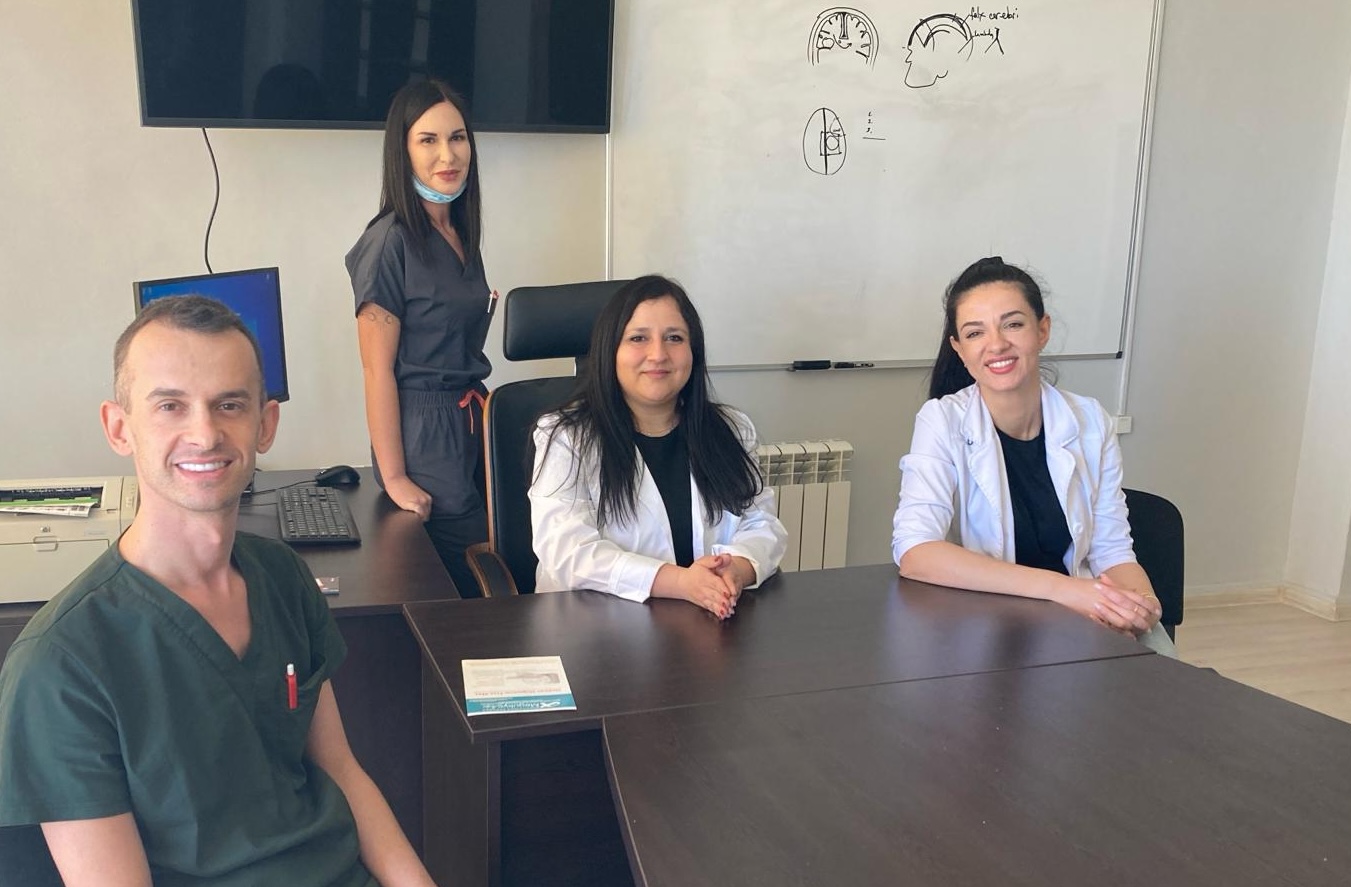
III Гордые моменты и идеальный мир
Д-р Манолова: Миссия каждого медицинского работника — помочь пациенту пациент. Мы все неврологи, работающие в экстренная, и поэтому знаем, каковы результаты, как краткосрочные, так и долгосрочные. Существует лечение, терапия инсульт, оно было установлено более 20 лет назад. Мы не можем позволить нам ничего не остановить, а даже не собственное беспокойство, потому что пациент просто не поправится сами по себе. исход будет влиять на пациент и его семью в течение всей жизни. Когда пациент находится на карьере перед вами, абсолютно беспомощный, это единственное, о чем вам нужно думать.
Невероятно важно обучать и поддерживать молодых врачей в их собственном росте и будущем дисциплины. Мы должны инвестировать в молодых людей, делиться с ними нашим ценным опытом, чтобы положить их на путь к саморазвитию, и чтобы они были уверены в том, что они смогут принять инновации в современной неврология.
Они также должны принять, что ошибки являются частью игры. Только тот, кто не работает, не делает никаких ошибок. Вам просто нужно учиться на своих действиях и двигаться вперед. Это то, что я обучаю своих жителей.
Д-р Георгиев: Я работаю в этой клинике, безусловно, влияет на мое профессиональное развитие, но это также помогло мне получить большее признание самой жизни — того, что действительно важно.
Д-р Аргирова: Профессионально Я получил много опыта. Я принимаю решения быстро и уверенно; я знаю, что нет другого варианта, и я должен делать все возможное для пациентов. Я чувствую такое же влияние на свою личную жизнь.
Д-р Манолова:Получение Награда ESO Angels было горжущим моментом, конечно. Это было неожиданно, на самом деле, мы этого не ожидали. Но гордые моменты случаются почти каждый день, когда я вижу, как мои коллеги лечат пациентов с инсульт. Я активно участвую в их работе и каждый день заставляю меня гордиться. Я горжусь д-ром Аргировой, когда она спасла жизнь молодого человека в возрасте 36 лет. Я горжусь тем, что д-р Найденов, которому удалось ввести rtPA пациент в течение 10 минут после его прибытия.
Д-р Кристиан Найденов: Благодаря проф. Манчеву я прибыл в эту клинику. Он обращал внимание на меня как на студента, благодарил меня за интерес и порекомендовал меня.
Я решила изучить лекарственный препарат, потому что искала чистый и интеллектуальный продукт. Неврология была любовью с первого взгляда и все еще есть. Мы находимся на 10-м году нашего романа, который является критическим годом в долгосрочных отношениях.
Профессионально опыт работы в этой клинике позволил мне начать мое развитие. Я опираюсь на свои знания и опыт каждый день. Однако это помешало моей личной жизни — работа очень напряженная, и мы приносим это домой с собой. Тяжелая ответственность, которую мы несем, всегда взвешивает меня.
Я также узнал, что общие знания о здоровье населения слишком низки, приоритеты пациентов расположены неправильно, а их общий уровень образования напрямую коррелирует с тем, что они делают для сохранения своего здоровья. Я узнала, что для успешного невролог у вас должно быть много хороших личных качеств, и что вы должны выполнять объем работы, необходимый в соответствии с необходимыми высокими стандартами.
Д-р Димитров: С точки зрения С помощью СМП, наши оставшиеся проблемы в два раза. Во-первых, это широкая общественность и насущная потребность в таких кампаниях по повышению осведомленности, как супергерои М.О.З.Г. 4,5 в школах, но также и для взрослых, чтобы научиться распознавать симптомы инсульт и немедленно позвонить по телефону 112. Во-вторых, повышение осведомленности и квалификации наших коллег по С помощью СМП посредством совместной теоретической и практической подготовки с коллегами из больницы.
Д-р Манолова: В идеальном мире я бы изменил мотивацию неврологов для лечения инсульт. Я бы изменил их приоритеты, чтобы они были более вовлечены в своевременное вмешательство при инсульт.
Д-р Кристиан Найденов: Я мечтаю о том, что для каждого врача есть две медсестры и четыре переносщика, как это описано в национальном законодательном стандарте. Но мы поняли, что должны полагаться на себя. Вся наша команда работает над решением всех проблем, которые мы можем решить, путем просвещения новых кадр и охвата общественности. Наша мотивация — это команда, в которой мы работаем.

